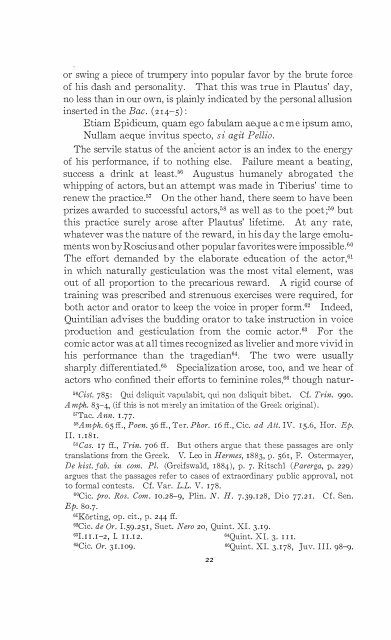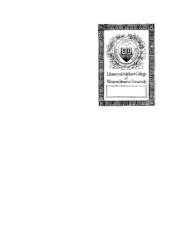Create successful ePaper yourself
Turn your PDF publications into a flip-book with our unique Google optimized e-Paper software.
or swing a piece of trumpery into popular favor by the brute force<br />
of his dash and personality. That this was true in Plautus' day,<br />
no less than in our own, is plainly indicated by the personal allusion<br />
inserted in the Bac. (214-5):<br />
Etiam Epidicum, quam ego fabulam aelJ.ue ac me ipsum amo,<br />
Nullam aeque invitus specto, si agit Pellio.<br />
The servile status of the ancient actor is an index to the energy<br />
of his performance, if to nothing else. Failure meant a beating,<br />
success a drink at least. 56 Augustus humanely abrogated the<br />
whipping of actors, but an attempt was made in Tiberius' time to<br />
renew the practice. 57 On the other hand, there seem to have been<br />
prizes awarded to successful actors,58 as well as to the poet ;59 but<br />
this practice surely arose after Plautus' lifetime. At any rate,<br />
whatever was the nature of the reward, in his day the large emoluments<br />
won by Roscius and other popular favorites were impossible.60<br />
The effort demanded by the elaborate education of the actor,61<br />
in which naturally gesticulation was the most vital element, was<br />
out of all proportion to the precarious reward. A rigid course of<br />
training was prescribed and strenuous exercises were required, for<br />
both actor and orator to keep the voice in proper form.62 Indeed,<br />
Quintilian advises the budding orator to take instruction in voice<br />
production and gesticulation from the comic actor.63 For the<br />
comic actor was at all times recognized as livelier and more vivid in<br />
his performance than the tragedian64. The two were usually<br />
sharply differentiated.65 Specialization arose, too, and we hear of<br />
actors who confined their efforts to feminine roles,66 though natur-<br />
56Cist. 785 : Qui deliquit vapulabit, qui non dcliquit bibet. Cf. Trin. 990.<br />
A mph. 83-4, (if this is not merely an imitation of the Greek original) .<br />
"Tac. Ann. 1.77.<br />
58Amph. 65 ff., Poen. 36 ff. , TeL Phor. 16 ff., Cic. ad Alt. IV. 1 5.6, HOL Ep.<br />
II. 1.181.<br />
" Cas. 17 ff. , Trin. 706 ff. But others argue that these passages are only<br />
translations from the Greek. V. Leo in Hermes, 1883, p. 561, F. Ostermayer,<br />
De hist. Jab. in com. Pl. (Greifswald, 1884), p. 7. Ritschl (Parerga, p. 229)<br />
argues that the passages refer to cases of extraordinary public approval, not<br />
to formal contests. Cf. VaL L.L. V. 178.<br />
6°Cic. pro. Ros. Com. 10.28-9, Plin. N. H. 7.39.128, Dio 77.21. Cf. Sen.<br />
Ep. 80·7·<br />
61K6rting, op. cit., p. 244 ff.<br />
62Cic. de Or. 1.59 .251, Suet. Nero 20, Quint. XI. 3.19 .<br />
631.11.1 -2, I. 11.12. 64Quint. XI. 3. II 1.<br />
65Cic. Or. 31.109 . 66Quint. XI. 3.178, Juv. III. 98-9.<br />
22
















